Heartless Blu-ray Movie
HomeHeartless Blu-ray Movie 
Blu-ray + DVDArrow | 1968 | 92 min | Not rated | No Release Date
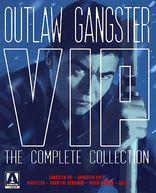
Price
Movie rating
7 | / 10 |
Blu-ray rating
| Users | 0.0 | |
| Reviewer | 3.0 | |
| Overall | 3.0 |
Overview
Heartless (1968)
Goro Fujikawa (Tetsuya Watari) was indebted to Mitsugimoto. Sawada, a low rank yakuza with a gambling problem owed Mitsugimoto three million yen. This equation can only lead to one answer. Mitsugimoto needs to pay and Goro’s coming to collect.
Starring: Tetsuya Watari, Chieko Matsubara, Kôji Wada, Hiroshi Nawa, Isao TamagawaDirector: Mio Ezaki
| Foreign | Uncertain |
| Crime | Uncertain |
| Action | Uncertain |
Specifications
Video
Video codec: MPEG-4 AVC
Video resolution: 1080p
Aspect ratio: 2.44:1
Original aspect ratio: 2.35:1
Audio
Japanese: LPCM Mono
Subtitles
English
Discs
50GB Blu-ray Disc
Two-disc set (1 BD, 1 DVD)
DVD copy
Playback
Region A (B, C untested)
Review
Rating summary
| Movie | 3.0 | |
| Video | 3.0 | |
| Audio | 3.5 | |
| Extras | 1.0 | |
| Overall | 3.0 |
Heartless Blu-ray Movie Review
Reviewed by Jeffrey Kauffman April 24, 2016Note: This film is currently available as part of the Outlaw: Gangster VIP Collection.
It’s certainly not a scientific survey by any stretch of the imagination, but when I quizzed a coterie of Japanese film fan friends of mine to
name a
Japanese film studio, absolutely no one came up with Nikkatsu. Toho was quite popular, as was Toie, but Japan’s oldest studio didn’t even
rate one single, solitary mention. Nikkatsu’s rather redolent history goes all the way back to 1912, easily eclipsing Toho’s genesis circa 1932
or Toie’s origination a few years later in 1938. For whatever reason, though, Nikkatsu, despite its status as the “dean” of Japanese movie
studios, doesn’t seem to have the same general notoriety that some of its competitors do. Nikkatsu may be best remembered by at least
some fans for its so-called “pink film” era, a kind of quasi-soft porn (sometimes maybe a little “harder” than merely soft) approach that
helped the studio weather the roiling 1970s era, when big studios, no matter where they might be located, were facing a rapidly changing
set of demographics and an often frustrating and potentially life threatening new set of economic challenges. One of Nikkatsu’s pre-pink era
calling cards was a short-lived but temporarily almost insanely popular franchise which began with 1968’s Gangster VIP, which is also
known by the slightly different title Outlaw: Gangster VIP. As Jasper Sharp mentions on his commentary for the first film of this new
six film set, the kind of ironic thing about this series coming out of Nikkatsu is that Toie had already staked a claim of sorts on the Japanese
gangster film idiom, kind of like Warner Brothers did in the United States back in the 1930s. The Outlaw: Gangster VIP series wasn’t
very long lived, lasting only around two years from 1968-1969, but it’s a really interesting aggregation of films that should appeal to lovers of
yakuza fare or even those who simply like to ferret out largely unseen entries that have been hidden in the various nooks and crannies of
Japanese cultdom for decades.
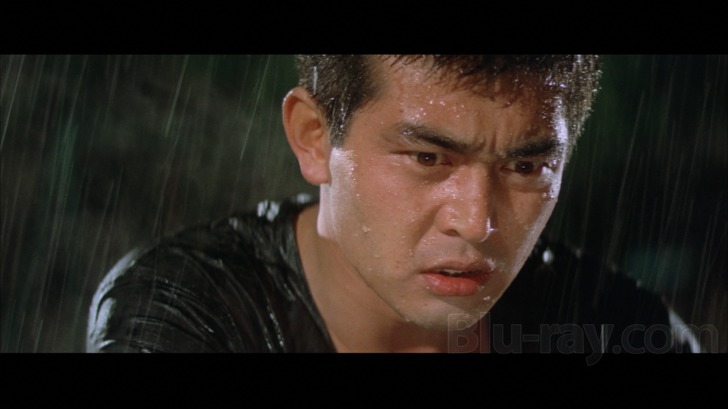
In his overview of the entire Outlaw: Gangster VIP franchise included in the booklet accompanying this new set from Arrow, Chris D. mentions that he feels that Heartless, the third film in the series, and Black Dagger, the fifth film, are (in his estimation) the weakest. There’s little doubt that Heartless is probably overly derivative, simply repeating points that have already been covered in one way or the other in the two previous films. Part of this tendency may be simply due to the fact that Nikkatsu, realizing they had something of a cash cow on their hands, tried to pump out these sequels in an incredibly quick fashion. This film appeared only around three months after Gangster VIP 2.
Somewhat similarly to Gangster VIP 2, a traditional romantic arc between Tetsuya Watari as Goro Fujikawa and Chieko Matsubara, now playing a character named Keiko Hashizume, is shunted to the sidelines, at least initially, as Goro pursues justice for another woman (indeed much as he did in the immediately prior film). This time it’s a pretty widow (played perhaps by Chikage Ôgi—online data on this film is a bit hard to decipher at times) of a former cohort who is experiencing some pretty severe health problems. Goro is attempting to get her to a safe port (figuratively and literally), but first has to deal with the semi-comedic Kubo (Eiji Gô), a yakuza wannabe who yearns to be Goro’s “henchman”.
In the generalist featurette included in this set which briefly recaps all six films, Kevin Gilvear mentions that Heartless “retreads” the first film, though it’s at least arguable that Heartless utilizes some story elements from the second film at least as much as those from the first film. There’s a therefore somewhat tired feeling to at least some of the proceedings here, and the production suffers at times from some unintentional humor (those who play the piano may burst out laughing at some of the most inept “finger synching” ever caught on celluloid, courtesy of Keiko supposedly playing a tune). Still, there are some standout sequences here, including a knockout final fight in a paint factory, where Goro and his enemies slither around in an increasingly slimy morass of spilled hues, all while viciously stabbing each other.
Note: The disc containing this film and Goro the Assassin encountered some pretty severe loading issues on my PS3, including that ever ominous grinding noise, despite having no observable defects on the surface. The disc absolutely refused to load at all on my PC drive equipped with PowerDVD.
Heartless Blu-ray Movie, Video Quality 

Heartless is presented on Blu-ray courtesy of Arrow Films with an AVC encoded 1080p transfer in 2.44:1. All six films in the Outlaw
Gangster VIP franchise share some common characteristics, and so I will be offering some general assessments that pertain to the series
as a whole before moving on to more specific comments about this particular film. Arrow's brief comments on the provenance of the elements
utilized for these transfers mentions only that "The Outlaw Gangster VIP series was transferred from original preservation film elements
by Nikkatsu Studios in Japan. All six films were delivered to Arrow Films as remastered files." This unfortunately doesn't really provide a lot of
information, and it's my assumption that at least some of these may have been transferred from secondary sources like prints rather than IPs or
negatives. Several of the films have recurrent brightness and contrast fluctuations which are quite noticeable and create a kind of slow motion
quasi-flicker, with clear gradations in tones especially visible in darker moments. While elements show various signs of wear and tear, and
feature slight fading which tends to skew flesh tones toward the brown side of things, palettes are overall quite convincing and robust, especially
when it comes to aspects like the bright red blood that flows so ubiquitously in each of the entries.
While the general color scheme of the film comes through quite convincingly, this is the first transfer of the series that exhibits unmistakable
brightness fluctuations and some pretty anemic contrast, something that tends to give blacks a fairly milky ambience at times. Watch for example
the action sequence starting at circa 28:30 and the fluctuations in brightness and contrast are quite noticeable, something that recurs
throughout the presentation and is especially noticeable in darker moments. This is also another film where I felt there may be a slight
anamorphic (horizontal) squeeze. Again, this is a minimal issue, if indeed it's an issue at all. Things are certainly watchable, and despite some
typical age related wear and tear, things are in overall good to very good shape, with a well regulated grain field and a commendably organic
appearance.
Heartless Blu-ray Movie, Audio Quality 
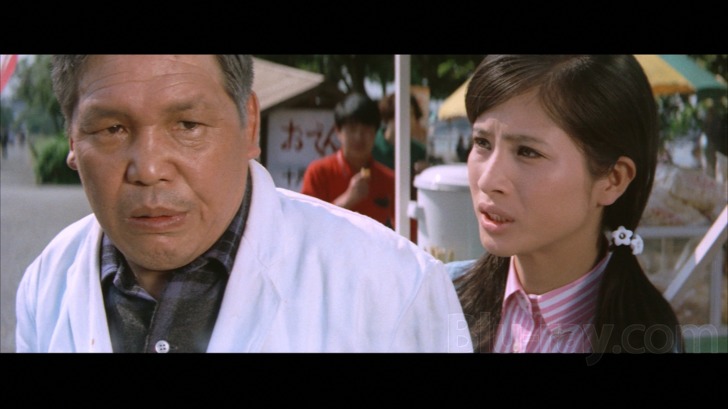
All six films in this set feature uncompressed LPCM Mono tracks in the original Japanese. None of the films is going to set audiophiles' hearts on fire, but with occasional exceptions (Black Dagger being the most noticeable one), there are few real problems with distortion or other age related issues. The films' dialogue and effects are typically rendered with decent force and fidelity, and the fun scores also sound decent, if narrow. Black Dagger receives the lowest audio score of any film in this set due to some distortion that's evident, most noticeably when music is playing.
Heartless Blu-ray Movie, Special Features and Extras 
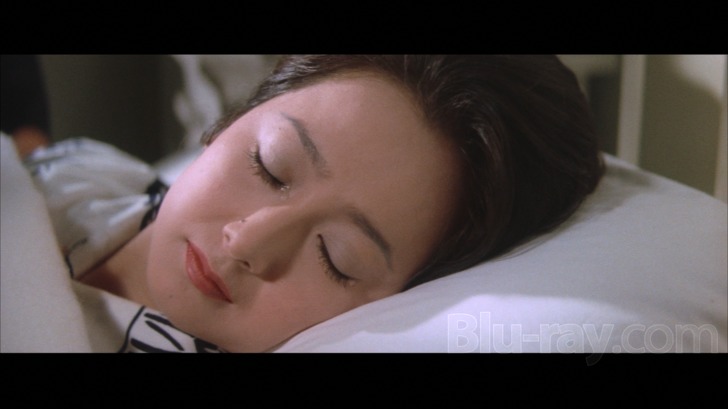
- Trailer (1080p; 2:35)
- Gallery (1080p)
Heartless Blu-ray Movie, Overall Score and Recommendation 
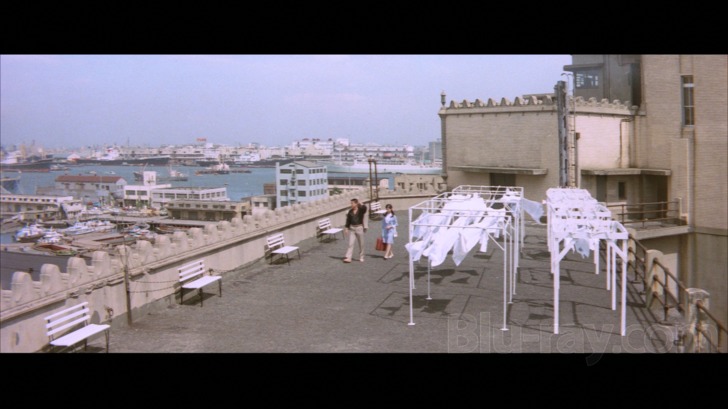
Heartless is a typical "middle child", a little insecure and tending to ape its elder siblings a bit too often. This transfer also has some more noticeable issues than the two previous siblings, something that will continue for the next couple of entries. While not up to the level of the first two films, there are still some enjoyable set pieces here and Goro continues to be an engaging anti-hero.
Similar titles
Similar titles you might also like
(Still not reliable for this title)

Black Dagger
1968

Goro the Assassin
1968

Kill!
1969

Gangster VIP
1968

Gangster VIP 2
1968

Massacre Gun
Minagoroshi no kenjû
1967

Hiroshima Death Match
Battles Without Honor and Humanity - Deadly Fight in Hiroshima
1973

The Rambling Guitarist
ギターを持った渡り鳥 / Guitar wo Motta Wataridori
1959

Red Pier
赤い波止場 / Akai hatoba
1958

Retaliation
縄張はもらった / Shima wa moratta
1968

Stray Cat Rock: Delinquent Girl Boss
1970

Stray Cat Rock: Wild Jumbo
1970

Dead or Alive 2
2000

Battles Without Honor and Humanity
1973

Proxy War
Battles Without Honor and Humanity
1973

Police Tactics
Battles Without Honor and Humanity
1974

Final Episode
Battles Without Honor and Humanity
1974

Street Mobster
現代やくざ 人斬り与太 / Gendai yakuza: hito-kiri yota
1972

Eight Hours of Terror
8時間の恐怖 / Hachijikan no kyôfu
1957

Doberman Cop
ドーベルマン刑事 / Doberuman deka
1977